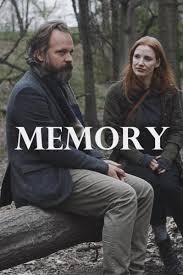
MEMORY
US, 2024, 103 minutes, Colour.
Jessica Chastain, Peter Sarsgaard, Merritt Weaver, Brooke Timber, Josh Charles, Jessica Harper.
Directed by Michel Franco.
Memory is a powerful human gift, the past to be re-lived. Some great happiness, some regrets and sadness. But, memories are elusive. They come. They go. They fade. And they can become entangled.
Here is a strong human drama where memory and loss of memory play an important role. We are first introduced to Sylvia, the always reliable Jessica Chastain, some extreme close-ups of members of an AA group giving their testimony, and praising Sylvia for 13 years of being clean, sober.
Sylvia is a single mother, her teenage daughter, living at home, and Sylvia working at a centre for the disabled. She has a bond with her younger sister. But she has a loathing and hatred for her mother. One night, she is rather unwillingly present at a high school reunion and a man comes and sits next to her, saying nothing. She leaves. He follows. He camps outside her house for the night.
In fact, he is Saul, Peter Starsky and winning best actor award for this performance and the 2024 Venice film Festival. He suffers from incipient dementia which is gradually taking over.
While the film shows us the growing rapport between Sylvia and Saul, not always easy, we discover more about their memories and his loss of memory. Saul is cared for by his strict and protective brother, Isaac (Josh Charles), who realises that Saul can depend on Sylvia and employs her as Saul’s carer. A positive part of the good bonding with Saul is Sylvia’s daughter and her support of him, a friendship.
But, Sylvia had remembered something about Saul, an assault in high school days, which proves to be a false memory, timing not correct. We see Sylvia going back into her memories, especially of her relationship with her father, and the animosity towards her mother (Jessica Harper) who is wanting to bond with her granddaughter still clashing with Sylvia.
There is some intensity in this exploration of memories, of false memories, often covering memories, and characters who are unwilling to remember or suppress memories.
But, in exploring human nature, Mexican writer-director, Michel Franco, offers and option for hope, for good relationships, and for some healing of memories even if, for Saul, they continue to recede.
- The title, not appearing until the end? The role of memory, loss of memory, opening up of memories, false memories?
- New York settings, neighbourhoods, streets, homes, interiors, meeting places, shelters, subway stations? The musical score? The repetition of A Whiter Shade of Pale? Its significance for Saul? Listening to it over and over? The final credits?
- The introduction setting the tone, the extreme close-ups of the members of the AA group, their testimonies, the revelations, problems?
- The focus on Sylvia, 13 years, the sponsor, the congratulations? Sylvia at work, the shelter, the various characters, chatting, serving the food? Her home life, her daughter, Anna, at the meeting, supporting her mother? Their going to school together? Scenes at home? Sylvia, absent husband and father, her hatred of her mother, the reasons? Protective of her daughter?
- Olivia, younger sister, memories of the past, support, tensions between them, Olivia’s family, the visit, the children asking very direct questions, the reaction of their father, issues of addiction, of sexual abuse, his closing the conversation? Olivia support of Sylvia at work?
- The college reunion, the celebrations, Sylvia deciding to leave, Saul sitting next to her, his following her, the streets, subway, the train, outside her house, in the rain? Her coming out in the morning, his identity, the phone calls, being collected?
- Saul, age, personality, dementia, under the care of Isaac, Isaac’s daughter, the decision to ask Sylvia to care for him? Her agreeing? The offer of the money?
- The film exploring the growing relationship between Saul and Sylvia, at his home, the care, the conversations, the walk in the park, her accusing him of abuse, the later information about dates and her false accusation, her wrong memories? Taking his identity card, returning it, his being abandoned?
- The details of the friendship, the talking, the reality of the dementia, his taking notes, the outings, the restaurant and his remembering the food but not the staff, his brother blocking his credit card? At home with Anna, playing the games? The bonding?
- Isaac, his disapproval, angers, stopping the credit card? Firing Sylvia, the new Guardian?
- Saul and his defiance, his going home with Sylvia, their meeting at the shelter, going outside, the bench, the kissing? Staying at home in Anna’s room, his collapsing in the bathroom, the sexual encounters? The consequences?
- Sylvia’s mother, living in Florida, her social charity work, wealth, coming to New York, the encounter with Anna, talking, with Olivia and the family? Sylvia arriving, confronting her mother, expressing her hatred? The tangling of the memories, Sylvia and the relationship with her father, in the room watching television, Olivia reticent, the accusations against their mother, her knowing what was happening?
- The effect of the meeting with her mother on Sylvia, Olivia coming to see her, the untangling of the past memories, their father?
- Anna visiting the house, the new Guardian, taking Saul in the train, bringing home, the reuniting with Sylvia? A future?
- The exploration of sexual abuse and the consequences, memories, hidden and overt, erroneous? Consequences? Parental control and loss of control? Issues of addiction? The final visit to the AA meeting and the declaration of the prayer? Mental illness and conditions? Support, empathy, a future?